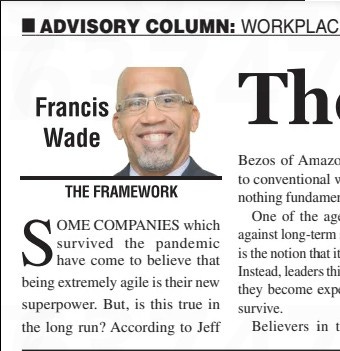Transcript / Article from a recent blog post
Some companies that survived the pandemic now tout extreme agility as their superpower. But is this a sustainable approach? According to Jeff Bezos of Amazon, the answer may lie in focusing on what hasn’t changed, even amid turmoil.
The Agility Debate
Critics of long-term strategic thinking argue that it stifles flexibility. They believe leaders must prioritize adaptability, mastering the art of the pivot to stay afloat.
Adherents to this philosophy often chase short-term gains, juggling endless opportunities and quick fixes. Unfortunately, this leaves little room for deep reflection or meaningful answers to big questions. The result? A constant state of urgency that might, ironically, hinder growth.
Is this short-sighted?
Emergencies do demand immediate action, but the adrenaline rush of reactive leadership can become addictive. Could this obsession with rapid responses undermine long-term success?
Here’s Bezos’s take:
“I very frequently get the question: ‘What’s going to change in the next 10 years?’ And that is a very interesting question; it’s a very common one. I almost never get the question: ‘What’s not going to change in the next 10 years?’ And I submit to you that that second question is actually the more important of the two.”
In other words, lasting success comes from building a strategy around stability rather than unpredictability.
Anchoring to Customer Needs
Tony Ulwick offers a framework to understand stability through unmet needs, which drive people to take purposeful action—what he calls “Jobs to Be Done” (JTBD).
For example, before hamburgers became the most popular fast food, other regional choices like hot dogs, tacos, fish and chips and noodles dominated as go-to quick meals. Today, there’s a broad menu of options, but the underlying job remains the same: satisfying immediate hunger with a fast, affordable solution.
This stability extends to other industries. A trendy restaurant might offer an innovative menu, but it still relies on timeless needs—good food, quick service, and affordability.
Yet, when disruptions arise, some leaders lose sight of these enduring truths. Consider a cafe owner, struggling with sales, who decides to sell branded apparel alongside lunch. Such zigzag responses might miss the mark entirely.
Instead, here’s a better way forward:
Acknowledge unmet needs and JTBDs remain constant.
Identify how disruptions are creating new obstacles for customers.
Diagnose opportunities to remove those obstacles.
Act swiftly before competitors do.
Take, for instance, many countries’ ongoing ATM crisis. As banks close branches to cut costs, customers face immense frustration over fewer functional ATMs. Despite this glaring issue, few financial institutions have stepped in with viable solutions.
As the holiday season amplifies the problem, even the central banks have expressed concern. A bank that truly understood its customers’ JTBDs—secure and convenient access to cash—could innovate and dominate.
Why hasn’t this happened?
The Missing Emotional Connection
Some public-sector professionals demonstrate genuine passion for serving citizens. Their enthusiasm helps them deeply understand and empathize with people’s needs. They aren’t just doing a job—they’re solving problems they care about.
In contrast, private-sector leaders often lack this emotional connection. Their focus tends to be transactional, driven by profits. Customers’ needs become tools for financial gain, not ends in themselves.
This mindset falls short.
If leaders could develop a deeper empathy for customers’ challenges, they’d unlock a surprising source of competitive advantage. This applies across sectors, including non-profits and government organizations, where relevance remains crucial for funding and support.
Disruptions, rather than being excuses for frantic pivots, can become opportunities to reconnect with core customer needs. By anchoring your organization to JTBDs, you can stand out meaningfully.
Winning the Long Game
When leaders embrace stability over chaos, they discover depth rather than desperation. Customers notice, and their loyalty follows.
As Bezos reminds us, long-term success doesn’t come from guessing what will change but from staying true to what won’t. Build on this foundation, and you’ll always have a winning strategy.
This article is based on my fortnightly column in the Jamaica Gleaner dated 12-8-2024.






